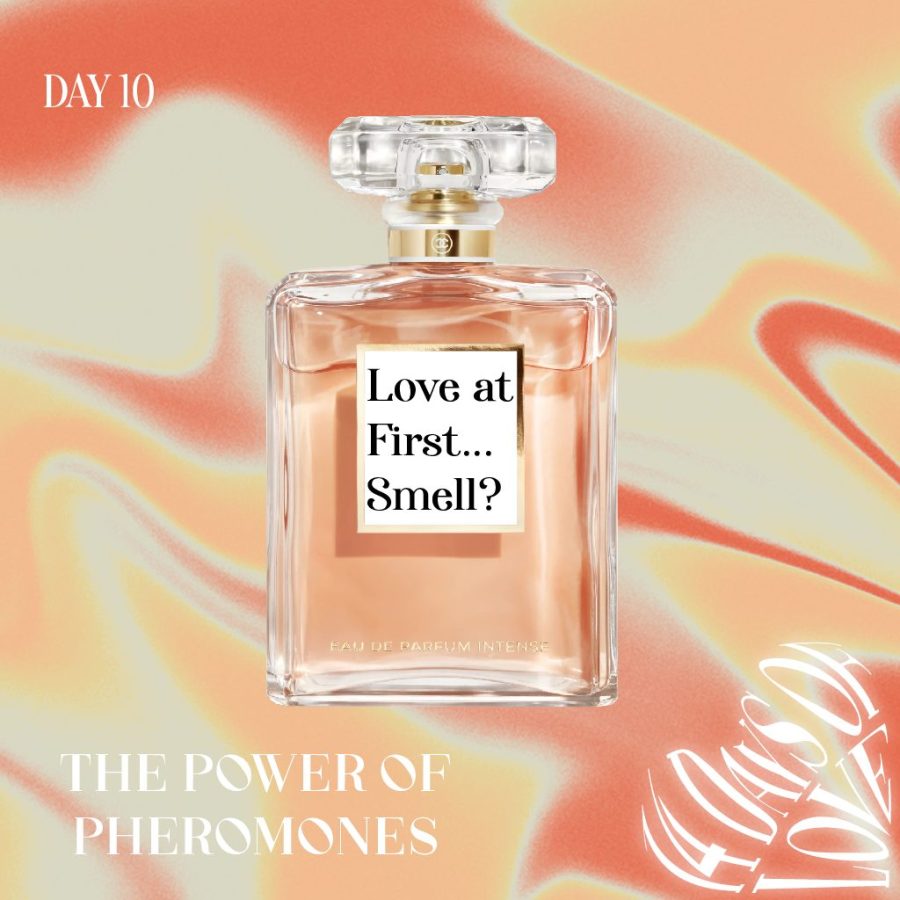14 Days of Love Day 10: Love at First… Smell? The Power of Pheromones
February 10, 2023
Have you ever been attracted to someone as soon as you met them but did not know why? Maybe you did not notice anything extraordinary in their appearance, but there you were, standing right next to them and suddenly an indescribable attraction for them arose. Love at first sight, lust and intense attraction can all contribute to a pheromonal attraction.
Pheromones are an odorless chemical that plants, fungi, insects and animals exude and secrete. Specifically, in the case of humans, it is secreted through sweat, tears and urine. In animals and plants, it is widely accepted that pheromones are released to communicate a message of sexual desire and allure to others of the same species. Pheromones are not actually smelt by the nose, but instead detected by the vomeronasal organ in the nasal cavity, which links to the olfactory bulb and in turn releases a signal in the form of brain waves.
Scientists in osmology, the scientific study of smells, have determined that individuals of the same species develop an attraction to one another through chemical messengers. These chemicals, when released, stimulate attraction, hormone levels and even fertility. The first discovered pheromone was present in female moths and is known as bombykol. In animals, pheromones serve the purpose of signaling others within the same species when the time comes to mate or to be territorial when referring to other animals.
Androsterone, or androstenol, is a putative human pheromone that contributes to women’s sexual appeal to men. Only 10% of men secrete an abundant amount of the pheromone, and these men may be considered the most “desirable” in the population. Androsterone can change the way people perceive someone’s desirability. Women also produce and release the pheromone, but at a rate four times lower than men. This pheromone is also produced by the sex glands and secreted through sebaceous glands as smegma from the sex organs of men and women.
Additionally, women produce a sex pheromone called copulin in addition to androsterone. Men do not produce copulin, however, and the pheromone seems to correlate to women’s menstrual cycles when measuring the amount secreted.
The level of pheromones a person produces may heavily influence their sexual behavior and sexual motivation. Those who produce an elevated level of pheromones tend to feel heightened attraction and bond with others. High levels of pheromones may also make people appear more sexually attractive, and therefore encourage more attention and social engagement from others.
People who have a love-at-first-sight reaction to someone or who feel a strong attraction to another person are typically experiencing a pheromone attraction. This also takes place when you meet someone and do not automatically feel a connection to them. When you meet someone and do not seem to like them for no apparent reason, a pheromonal reaction to the person can be a possible reason. In these cases, your pheromones may be telling you that this person is not a genetically appealing match for reproduction.
Pheromones are not just produced for sexual attraction. Numerous research studies have been done on breastfed newborns and their mothers. When two breast pads were placed on either side of a newborn, one the mother’s and the other a stranger’s, the newborn always moved toward the pad belonging to the mother. These studies suggest that we can detect each other through unique smells produced by pheromones; a version known as signaler pheromones.
Pheromones may also have a link to human sexuality. A 2005 study testing individuals of different sexual orientations, through blind sweat-smelling tests, showed that gay men were attracted to the scent of men who were also gay, and the scent of women attracted straight men. Pheromones have also been known to alter human moods. The scent secreted by fear hormones through sweat can raise another person’s anxiety levels when detected by smell. Studies also show that women tend to generate more relaxation around men who produce androstadiene.
If you ever bump into a stranger and they give you a double take, do not be so quick to judge. It might just be nature.










